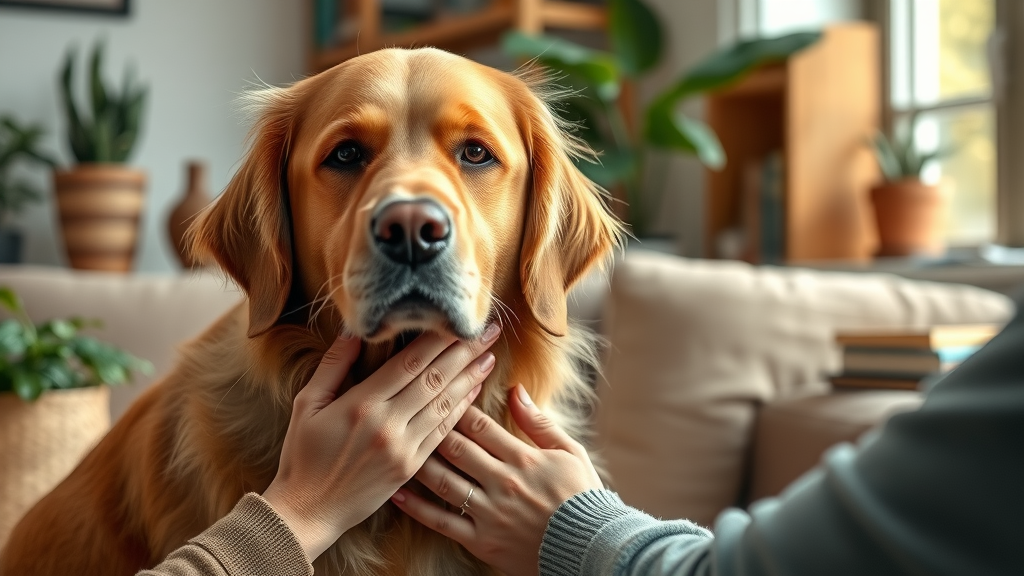Did you know that over 60% of pet owners consider holistic care to be essential for their dog’s well-being—yet essential natural strategies are still overlooked by most? If you’re searching for ways to give your canine companion a longer, happier, and healthier life, embracing a holistic approach for dogs might be the secret you’ve been missing. This comprehensive guide will walk you through everything you need to know about holistic veterinary care, from core principles to everyday practical tips, real-life wellness transformations, and expert-approved remedies. Are you ready to revolutionize your dog’s health—and your approach as a pet parent?

Revealing the Power of Holistic Care for Dogs: Surprising Stats That Will Change How Pet Owners Think
"Over 60% of pet owners now consider holistic care essential to their dog’s well-being—yet most still overlook key natural strategies for optimal pet health."
Pet health is undergoing a quiet revolution. With staggering numbers of pet parents finally recognizing the value of a holistic approach, more households are prioritizing a balanced, natural, and truly comprehensive wellness plan for their beloved pets. This shift highlights one crucial fact: true health means more than just the absence of disease—it’s about the overall quality of life and the harmony between body, mind, and environment. As modern veterinary science merges with time-tested holistic treatments, pet parents like you gain powerful new tools to address everything from stress relief to chronic issues—often with fewer side effects. Keep reading to discover exactly how holistic care for dogs can empower you as a pet owner and transform your dog’s health from nose to tail.
Traditional vet measures are only the beginning. As you learn about the full spectrum of holistic remedies, environmental wellness techniques, and mind-body strategies, you’ll uncover opportunities to minimize side effects , strengthen your dog’s immune system , and boost their day-to-day vitality. Whether you’re switching to whole-food diets, using gentle herbal remedies, or exploring aromatherapy and acupressure, holistic care for dogs offers lasting benefits every pet owner deserves.
What You Gain: Holistic Care for Dogs Essentials Every Pet Owner Should Know
- Core principles of holistic care for dogs
- How to identify and choose safe holistic treatment options
- Practical natural remedies and holistic veterinary insights
- Step-by-step guide on transforming your approach to dog health
No matter if you’re a first-time or seasoned pet owner, holistic care for dogs gives you access to knowledge and techniques that align with your dog’s innate needs. Not only can you refine diet, mood, and immunity, but you’ll be equipped to make better choices regarding both prevention and treatment with fewer risks of negative side effects often found in conventional medicine. Ultimately, modern holistic approaches provide both pet health improvements and peace of mind for pet parents aiming to give their dogs the best life possible.
| Main Topic | Typical Care | Holistic Care for Dogs Findings |
|---|---|---|
| Diet | Commercial dog food | Balanced whole foods & raw |
| Stress Relief | Occasional walks | Herbal remedies, acupressure, aromatherapy |
| Immunity | Vaccines, pills | Probiotics, nutrition, energy healing |
Holistic Care for Dogs Defined: What Every Pet Owner Must Understand
What is holistic dog care?
Holistic dog care is a comprehensive approach that considers the entire well-being of your pet, not just their physical symptoms. Unlike traditional vet care which often focuses on treating specific ailments or symptoms, holistic care emphasizes the balance between mind, body, spirit, and environment. For pet parents, this involves looking at nutrition, mental stimulation, stress reduction, environmental factors, and emotional health all together. This approach can include alternative treatments like herbal remedies, acupuncture, acupressure, and energy healing, often alongside conventional treatments, always aiming to minimize side effects and maximize quality of life.
Pet owners may also see holistic veterinary practices employing lab tests to assess nutrient levels, stress indicators, and immune function, tailoring care to the individual needs of each pet. The result is a fuller, more robust well-being for both dogs and cats, addressing underlying imbalances that may go unnoticed by traditional medicine. By focusing on the overall ecosystem of the animal, holistic care can often prevent chronic conditions and support longevity. This method is supported by organizations such as the American Holistic Veterinary Medical Association, whose standards and certifications ensure pets receive the safest and most effective integrative treatments available.

Key Principles of a True Holistic Approach for Pet Owners and Pet Parents
The Role of Mind-Body Balance in Holistic Veterinary and Holistic Treatment
At the heart of holistic care for dogs lies the concept of mind-body balance . This principle holds that a dog’s emotional, psychological, and biological realities are deeply intertwined. Stress, anxiety, and boredom can create cascading health issues from immune dysfunction to digestive troubles. For pet parents, understanding and supporting your dog’s inner harmony is crucial. Tools like herbal treatments, massage, acupressure, and play therapy are used to ease emotional distress and promote natural resilience. Mind-body balance is also about daily habits—consistent routines, gentle exercise, and supportive attention foster psychological safety and robust pet health .
Holistic treatments often integrate ancient healing wisdom such as Traditional Chinese Veterinary Medicine, which seeks to restore balance and flow in the body through tailored herbs, acupuncture, and energy work. The goal is always to prevent illness by ensuring your pet's body systems are operating in synchrony. Being mindful of your dog's mood, behavior changes, or physical discomfort can lead to earlier interventions and a higher quality of life .
Environmental Wellness: Creating a Safe, Enriching Space for Your Dog
A holistic approach extends far beyond what’s in your dog’s bowl. Creating a safe, enriching, and loving environment is just as important for pet health. From air quality to household chemicals, exposure to stressors, and the opportunity for play—all these factors shape your dog’s overall wellness. Holistic care encourages pet owners to make intentional choices : choose non-toxic cleaners, ensure regular access to fresh air and sunlight, rotate enrichment toys, and minimize exposure to environmental triggers that might harm your pet's immune system.
The physical and emotional environment you offer can either support or undermine even the most sophisticated dietary or therapeutic interventions. Small changes—like using essential oils for relaxation or providing a naturally lit resting area—can be profoundly soothing for sensitive dogs. For busy pet parents, holistic care is about building sustainable, mindful routines that safeguard your companion’s well-being at every level, every day.
The Main Benefits of Holistic Care for Dogs for Pet Health and Longevity
Reducing Stress Naturally: Herbal Remedies and Relaxation for Pet Parents
One of the most compelling benefits of holistic veterinary care is its success in reducing stress naturally. Instead of simply relying on pharmaceuticals, pet owners now have a wide range of herbal remedies and relaxation techniques to draw upon. Chamomile, valerian, and CBD (cannabidiol) are among the most studied natural calming aids, shown to soothe anxiety without harsh side effects. When combined with enrichment routines and regular exercise, these tools can fundamentally shift your dog’s stress response, leading to better digestion, fewer behavioral issues, and improved sleep.
This approach works hand-in-hand with the body’s nervous system for a gentle, sustained calming effect. Pet parents notice their dogs become more attentive, joyful, and resilient, even during routine stressors like vet visits or travel. Quality of life improves naturally—building trust, confidence, and emotional safety for both pet owners and their beloved animals.
Boosting Immunity Holistically with Nutrition, Herbs, and Lifestyle
Supporting your dog’s immune system is a cornerstone of holistic care. Instead of solely depending on vaccines or medications, holistic veterinary strategies incorporate robust nutrition (whole foods, superfoods, probiotics), gentle herbal therapies, and supportive lifestyle practices. These strengthen your pet’s natural defenses, minimizing the need for excessive pharmaceuticals and their associated side effects. Foods rich in antioxidants, omega fatty acids, and micronutrients provide powerful immune support and reduce inflammation—all while tasting delicious to your pet.
In addition, natural practices like acupressure and aromatherapy can further regulate immune responses and speed recovery from illness. Many pet owners discover that their dogs suffer from fewer recurrent infections, faster wound healing, and higher levels of daily energy when cared for holistically. This means less time at the vet for chronic complaints and more adventures together!
Understanding Holistic Diets for Dogs: The Foundation of Holistic Pet Health
What is a holistic diet for a dog?
A holistic diet for dogs emphasizes minimally processed, whole-food ingredients designed to meet all of your dog’s nutritional needs. Unlike most commercial dog foods that include fillers, preservatives, and artificial flavors, a holistic diet prioritizes fresh meats, vegetables, fruits, and natural supplements. Pet parents can expect more energy, healthier coats, improved digestion, and better weight management by making thoughtful dietary switches.
The philosophy behind holistic diets is rooted in species-appropriate nutrition, which mirrors what a dog would naturally eat in the wild but enhanced for modern life. Meals are tailored by age, size, activity level, and any existing health concerns. Pet owners often work with holistic veterinarians or certified nutritionists to craft balanced recipes—ensuring their pets receive vital micronutrients, enzymes, and probiotics missing from mass-produced kibble. Adopting a holistic approach to food is one of the most impactful steps to boost pet health and overall quality of life.

The Ultimate List: Top Natural Foods and Supplements for Holistic Veterinary Wellness
When feeding your dog the holistic way, variety and quality matter. Pet health experts recommend building meals around lean protein (like chicken, turkey, or fish), fresh vegetables (carrots, spinach, sweet potatoes), and healthy fats (such as salmon oil, flaxseed). Probiotic-rich foods—like unsweetened yogurt or kefir—help support digestion, while specific herbs and supplements strengthen immunity and tissue repair. Notable additions used by holistic veterinarians include:
- Bone broth (joint health, hydration)
- Blueberries (antioxidant support)
- Turmeric (anti-inflammatory properties)
- Green-lipped mussel (arthritis & mobility)
- Coconut oil (healthy skin & coat)
Supplements should always be introduced cautiously and in consultation with a holistic veterinarian—especially for dogs with pre-existing medical conditions. The goal is a balanced, diverse plate that supports the immune system, gut flora, and cellular resilience—paving the way for a life full of vitality and robust pet health.
Herbal Remedies and Holistic Treatments for Common Dog Health Concerns
Safe Herbal Remedies Every Pet Owner Should Have at Home
Stocking your pantry with herbal remedies can be a pet health game-changer. Chamomile for anxiety, licorice root for inflammation, calendula for skin healing, and milk thistle for liver support are all tried-and-true staples recommended by holistic veterinary professionals. These natural solutions often deliver effective relief for everyday complaints—without the risk of harsh side effects common in traditional vet medications.
It’s critical for pet owners to always use evidence-based dosages and formulations made specifically for dogs. Never substitute human-grade herbal products unless advised by a holistic veterinarian. Consulting your vet before incorporating new treatments ensures no possible interaction with existing medications or conditions. A well-stocked holistic medicine cabinet empowers you to care for minor ailments at home and fosters a proactive approach to dog wellness.
Holistic Treatments for Joint Health, Digestion, Skin, and More
Many dogs experience issues related to joints, skin, or digestion—where holistic treatments can offer gentle, sustained relief. For joint stiffness and mobility, glucosamine, chondroitin, MSM (methylsulfonylmethane), and green-lipped mussel extract are top choices that help rebuild cartilage and ease discomfort. For digestive challenges, slippery elm, marshmallow root, and pumpkin support regularity and soothe irritation. Skin conditions often respond well to aloe vera, omega fatty acid supplements, and natural calendula ointments.

These natural therapies tend to avoid the rebound side effects sometimes caused by synthetic drugs, making them favorites among holistic veterinarians and educated pet parents alike. When paired with a healthy diet and stress management plan, they deliver comprehensive support for long-term pet health, comfort, and quality of life .
Holistic Veterinary: Combining Science with Natural Wisdom for Holistic Care for Dogs
The Difference Between Conventional Veterinary Medicine and Holistic Veterinary Approaches
Conventional veterinary medicine typically leans on pharmaceuticals, surgery, and lab tests to diagnose and treat illness. While this can be life-saving during emergencies or acute conditions, it sometimes overlooks the root causes underlying chronic issues. Holistic veterinary care, by contrast, seeks to address the animal’s entire ecosystem—lifestyle, diet, emotional health, and living environment—employing both modern diagnostics and alternative therapies like acupuncture, nutrition plans, herbal formulas, and energy medicine.
This variety of holistic approaches doesn’t reject science—it enhances it, resulting in fewer side effects, improved patient compliance, and a greater focus on preventive care. Pet owners benefit from a more personalized, integrative treatment plan—no longer one-size-fits-all but truly responsive to the lived experience of their dog.
Integrative Strategies: When to Blend Holistic and Conventional Care
Many pet parents find the best health outcomes by combining strengths from both holistic and conventional veterinary care. This integrative model gives you access to the widest spectrum of safe and effective therapies. For example, a dog with arthritis may benefit from both vet-prescribed pain relievers and holistic remedies like joint-supportive supplements, acupuncture, and physical rehabilitation. Lab tests, traditional diagnosis, and acute intervention are still vital—especially for urgent or severe conditions—while holistic care fills the gaps of prevention, chronic condition management, and emotional well-being.
Choosing when to blend approaches comes down to open communication with your care team, clear assessment of your dog’s progress, and an individualized plan rooted in science and compassion. Always consult your vet when integrating any new therapy, and track results to ensure your pet’s evolving needs are met as a team.
Common Myths and Misconceptions About Holistic Care for Dogs Debunked
- Myth: Holistic treatments are not evidence-based.
- Myth: Only certain breeds benefit from holistic approaches.
- Myth: Holistic care means avoiding all conventional medicine.
Despite growing support, misconceptions about holistic medicine still linger. In reality, many holistic remedies are supported by scientific research, and safety is ensured through reputable organizations like the American Holistic Veterinary Medical Association. All breeds of dogs and cats can benefit from holistic approaches when tailored to individual needs. Importantly, holistic veterinary medicine encourages integrating both worlds—not abandoning one for the other. As more pet owners see positive results, these outdated ideas are quickly being replaced by evidence, experience, and improved quality of life for pets.
People Also Ask: Straight Answers for Pet Owners Exploring Holistic Care for Dogs
What is the 7 second rule for dogs?
The 7 second rule is a simple guideline that helps pet owners assess if pavement is too hot for their dog’s paws. Place the back of your hand on the sidewalk; if you can't comfortably hold it there for 7 seconds, it's likely too hot and could burn your dog's feet. This is especially crucial for pet parents during summer walks in urban areas where surfaces retain heat. Encouraging awareness of environmental risks is part of a holistic approach to safety and overall pet health.

What is the holistic approach to veterinary care?
A holistic approach to veterinary care means treating your dog as a whole being—looking beyond isolated symptoms to understand how physical, emotional, nutritional, and environmental factors all interact. Holistic veterinarians create customized plans that might combine diet changes, herbal supplements, massage, acupuncture, and modern medications as needed. This personalized strategy, endorsed by the American Holistic Veterinary Medical Association, supports long-term wellness, resilience, and overall quality of life .
Step-by-Step: How to Implement Holistic Care for Dogs at Home
- Assess your dog’s lifestyle, emotional health, and nutrition.
- Consult with a holistic veterinary professional.
- Introduce safe herbal remedies and whole-food diets.
- Make time for daily mental and physical enrichment.
- Establish regular natural health practices—grooming, acupressure, aromatherapy.
Starting a holistic journey doesn’t have to be overwhelming. Begin by observing your pet’s needs and noting areas like diet, behavior, and energy levels that could improve. Partnering with a holistic veterinarian ensures that you’re using safe and effective therapies—and avoiding any potential pitfalls of self-guided alternative treatments. Gradually adapt routines, introduce one change at a time, and prioritize daily enrichment. Daily mindfulness, touch, play, and gentle care make all the difference in your dog’s happiness and longevity.
Expert Insights: How Leading Veterinarians Approach Holistic Care for Dogs
"Holistic veterinary medicine isn’t about rejecting conventional treatments—it’s about expanding the toolkit so every dog gets the most complete care possible." – Dr. Emma Carter, DVM
Today’s best holistic veterinarians embrace science and nature in tandem. They assess medical history, lifestyle, psychological well-being, and even the pet parent’s habits to design tailored wellness plans. When necessary, they blend conventional treatments like antibiotics or surgery with holistic options such as herbal remedies, acupuncture, or nutritional therapy. This approach ensures every dog—no matter age or breed—receives the safest, most supportive care. As a pet owner, learning from holistic veterinary experts arms you with knowledge, confidence, and a renewed sense of partnership in your dog’s well-being journey.
Essential FAQs for Pet Owners New to Holistic Care for Dogs
- Is holistic care for dogs safe for puppies and senior dogs? Yes. Holistic care can be adapted for all life stages, provided you consult your vet for puppy- or senior-appropriate therapies and ensure remedies are dosed correctly for size and age.
- How quickly can I expect to see improvements with holistic treatments? Some holistic treatments (like certain herbal remedies or dietary changes) begin working within days to weeks, while others may require longer for full effects. Individual results vary, so track your dog’s response and consult your holistic veterinarian for guidance.
- Are there reputable certifications for holistic veterinary professionals? Yes. The American Holistic Veterinary Medical Association (AHVMA) and similar organizations offer certifications and continuing education for trained holistic vets. Always verify credentials before starting any new therapy.
- Can I use holistic and conventional treatments together? Absolutely. Many pet health experts encourage integrative care, but always keep your primary vet in the loop to avoid treatment overlaps or interactions.
Key Steps to Transitioning to Holistic Care for Dogs: Practical Tips for Pet Owners
- Start with small dietary and lifestyle changes.
- Monitor your dog's response and track health improvements.
- Seek ongoing education from trustworthy holistic veterinary sources.
- Build a support network of experienced pet owners and pet parents.

The most successful holistic journeys are gradual. Start by switching out one commercial treat for a whole-food option or adding a calming daily ritual. Journal results, observe your pet’s mood and health, then build on what works. Reliable peer communities and expert sources such as American Holistic Veterinary Medical Association offer ongoing support for both pet owners and pet parents determined to give their dogs the very best.
Take Action for Your Dog’s Well-being: Try Holistic Care for Dogs Today
Discover safe, effective natural remedies to soothe your dog’s common health issues—no harsh chemicals, just gentle care from nose to tail. Give your pup the relief they deserve—explore natural remedies trusted by dog lovers for calm, comfort, and wellness. Tired of meds with side effects? Learn how natural remedies can support your dog’s health the gentle, holistic way.
Conclusion: Start with small, mindful changes—partner with an expert, listen to your dog, and embrace holistic care for lifelong health and happiness.
To deepen your understanding of holistic care for dogs, consider exploring the following resources:
-
The American Kennel Club’s article, “ How Holistic Care Can Help Your Dog ,” provides insights into various holistic practices, including acupuncture, massage, and dietary adjustments, and their benefits for canine health.
-
NUTRO™ offers a comprehensive guide titled “ What Does Holistic Care Look Like for Your Dog? ,” detailing practical applications of holistic care such as aromatherapy, chiropractic treatments, and tailored exercise routines to enhance your dog’s well-being.
These resources offer valuable information to help you implement holistic practices that can contribute to your dog’s overall health and happiness.
 Add Row
Add Row  Add
Add 








Write A Comment